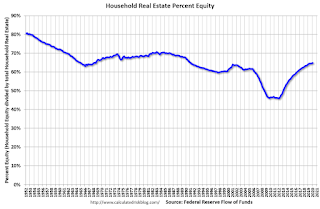by Calculated Risk on 6/11/2020 01:24:00 PM
Thursday, June 11, 2020
Fed's Flow of Funds: Household Net Worth Decreased $7.4 Trillion in Q1
The Federal Reserve released the Q1 2020 Flow of Funds report today: Flow of Funds.
The net worth of households and nonprofits fell to $110.8 trillion during the first quarter of 2020. The value of directly and indirectly held corporate equities decreased $7.8 trillion and the value of real estate increased $0.4 trillion.
Household debt increased 3.9 percent at an annual rate in the first quarter of 2020. Consumer credit grew at an annual rate of 1.6 percent, while mortgage debt (excluding charge-offs) grew at an annual rate of 3.2 percent.
 Click on graph for larger image.
Click on graph for larger image.The first graph shows Households and Nonprofit net worth as a percent of GDP. Even with the decline in stock prices in March, household net worth, as a percent of GDP, was higher than the peak in 2006 (housing bubble), and above the stock bubble peak.
Net Worth as a percent of GDP decreased in Q1.
This includes real estate and financial assets (stocks, bonds, pension reserves, deposits, etc) net of liabilities (mostly mortgages). Note that this does NOT include public debt obligations.
 This graph shows homeowner percent equity since 1952.
This graph shows homeowner percent equity since 1952. Household percent equity (as measured by the Fed) collapsed when house prices fell sharply in 2007 and 2008.
In Q1 2020, household percent equity (of household real estate) was at 64.8% - up from Q4.
Note: about 30.3% of owner occupied households had no mortgage debt as of April 2010. So the approximately 50+ million households with mortgages have less than 64.8% equity - and about 1.82 million homeowners still have negative equity.
 The third graph shows household real estate assets and mortgage debt as a percent of GDP.
The third graph shows household real estate assets and mortgage debt as a percent of GDP. Mortgage debt increased by $59 billion in Q1.
Mortgage debt is still down from the peak during the housing bubble, and, as a percent of GDP is at 49.1% - up from Q4 due to the decline in GDP - but down from a peak of 73.5% of GDP during the housing bubble.
The value of real estate, as a percent of GDP, increased in Q1, and is above the average of the last 30 years (excluding bubble).


